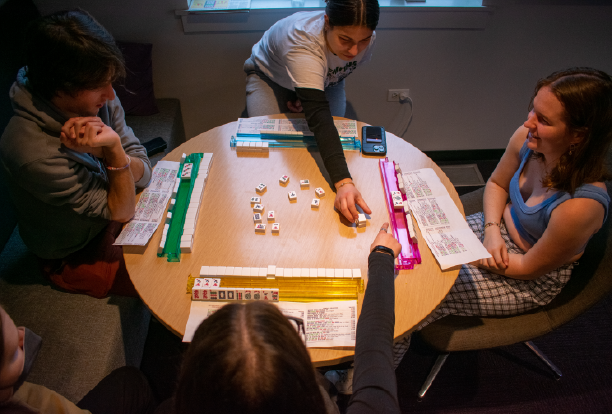
It’s 4:30 p.m. on a Sunday, and two students are dragging tables to the middle of the basement in Northwestern Hillel, the center for Jewish life on campus. As students seat themselves eight to a table, one retrieves a canvas bag and pours out an array of red-and-green-printed tiles. Passing around a Cheez-It box, a game of mah-jongg begins.
Mah-jongg is a tile-based game of Chinese origin. After gaining popularity in Shanghai in the late 19th century, it was introduced to the United States in the early 1920s. The game has since become a preferred pastime of Jewish American grandmothers.
SESP third-year Wendy Klunk, Hillel’s Religious & Spiritual Life Co-Chair, founded the Mah-jongg Club last fall. After advertising a practice session on Hillel’s Instagram and through a newsletter last October, she drew in six curious students — one of whom was SESP first-year and Hillel member Brooke Fein.
“The Mah-jongg Club is really just for fun and for relaxing and for meeting new friends.”
Wendy Klunk, SESP Third-Year
“The first meeting was very exciting,” Fein says. “I didn’t know what to expect. I didn’t know if people were gonna show up, but it was fun.”
From there, interest in the game grew in the Hillel community, and a group started to meet every Sunday. Thus, the Mah-jongg Club was born.
While the goal of mah-jongg is to collect a matching set of tiles, the members of the club recognize another more pressing objective of their meetings: Gossip. During the club’s two or three games every week, the participants go at a leisurely pace to chat as they play.
Another one of the Mah-jongg Club’s core tenets is inclusivity. The group is open to all students, regardless of skill level or if they are members of Hillel. To ensure that all who attend are able to participate in games, the club bends the rules of mah-jongg to allow teamplay.
“I feel like at Northwestern, if you’re in clubs it’s either professional development or something for your resume,” Klunk says. “The Mah-jongg Club is really just for fun and for relaxing and for meeting new friends.”
At around 6:30 p.m., the final round of mah-jongg draws to a close. The participants pack up their tiles, gather their belongings and leave to go about their evenings. Nearly all will be back next week to continue the tradition.